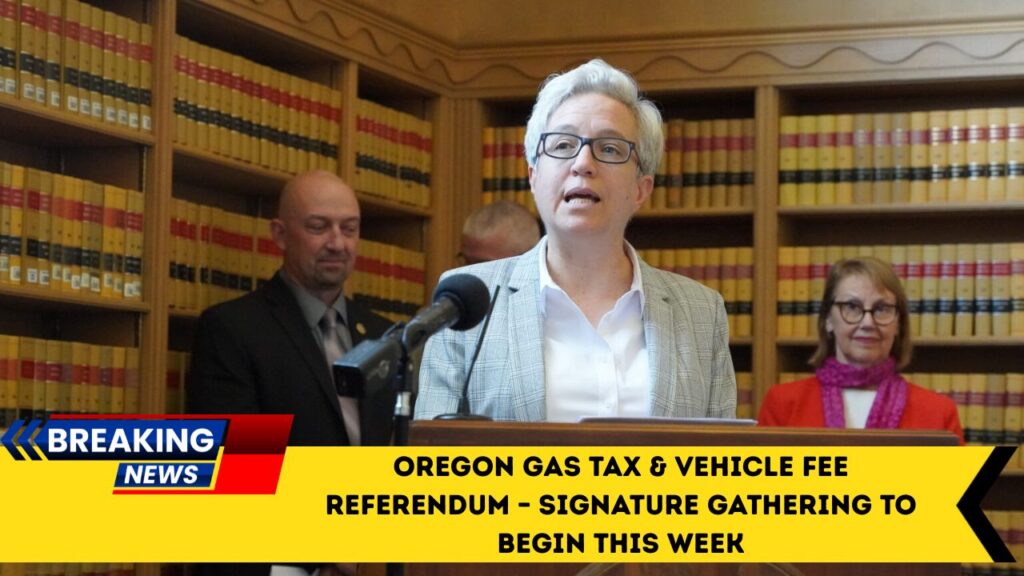Oregon’s new transportation funding law has become one of the most debated topics in the state. The law includes gas tax hikes, higher vehicle registration and title fees, and a road-usage charge that will impact millions of drivers.
However, many Oregonians believe these measures will increase the financial burden on residents already facing high fuel and living costs.
Now, a statewide referendum campaign is about to begin — with signature gathering expected to start by the end of this week. This move could give voters the final say on whether these new taxes and fees should remain in place.
Key Details of the Referendum
| Category | Details |
|---|---|
| Law Type | Transportation Funding Bill (Gas Tax & Vehicle Fees) |
| Purpose | To fund Oregon’s road and infrastructure improvements |
| Referendum Goal | Allow voters to decide if the new taxes and fees should stay |
| Signature Requirement | Around 78,000 valid signatures (4% of voter turnout from last governor’s race) |
| Deadline for Submission | December 30, 2025 |
| Expected Ballot Date | November 2026 |
| Main Supporters | Anti-tax groups, business associations, and citizen activists |
| Main Opponents | Lawmakers and local leaders supporting infrastructure investments |
What the Law Includes
The new law increases the gas tax by 6 cents per gallon, raises vehicle registration and title fees, and introduces a road usage charge that particularly affects owners of electric and hybrid vehicles.
Officials argue that these funds are necessary to repair and modernize Oregon’s transportation infrastructure, including roads, bridges, and public transit. Supporters say the revenue will secure billions of dollars in upgrades over the next decade.
However, critics insist that the state could fund infrastructure improvements without raising fuel taxes during a time of high inflation.
They say Oregon’s gas prices are already among the highest in the nation, and that additional fees unfairly punish middle- and low-income families.
Why the Referendum Push Is Growing
Petitioners believe that residents should have the right to vote directly on the new tax increases. Signature gathering teams are now being organized across counties, focusing on urban and rural regions alike.
The referendum process in Oregon allows voters to reject new laws within 90 days after they are signed. However, due to the timeline of this particular legislation, signature collectors will have until late December 2025 to meet the threshold.
If they gather enough signatures, the implementation of the law could be paused, pending the outcome of the November 2026 election.
What’s at Stake
If the referendum qualifies and voters reject the transportation law:
- The gas tax and vehicle fee hikes would be rolled back.
- The state’s funding for certain transportation projects may be reduced or delayed.
- Lawmakers could be forced to revisit how Oregon pays for road and bridge maintenance.
If voters approve the law:
- The new taxes and fees would remain in effect.
- Oregon’s infrastructure budget would continue as planned.
- Additional state programs for green transportation and electric vehicles would expand.
What Happens Next
The signature gathering process is expected to begin within days. Once petitions are officially approved, canvassers will start collecting signatures statewide.
Activists plan to set up booths at community centers, fuel stations, and local events. If momentum builds quickly, they may exceed the minimum requirement before the deadline.
For now, all eyes are on Oregon’s Secretary of State, who will oversee the petition verification process before the measure officially qualifies for the ballot.
The upcoming Oregon gas tax and vehicle fee referendum could become one of the state’s most significant political movements of 2025.
With signature gathering set to start by the end of the week, Oregonians are preparing for a spirited debate over whether higher transportation costs are justified.
If the petition drive succeeds, every voter in Oregon will have the chance in November 2026 to determine whether these new taxes and fees should stand — a decision that will shape the state’s future infrastructure and economy for years to come.
